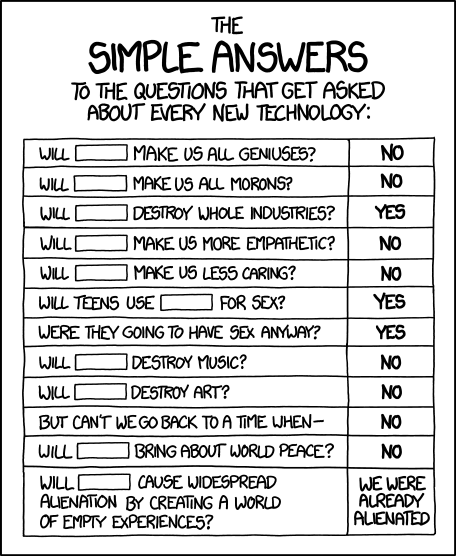By MinuteEarth
Wednesday, November 27, 2013
3D Sensor for iPad
This looks like fun: a 3D laser scanner that attaches to an iPad - so now you can combine the image from the camera with the 3D shape of whatever you are photographing. Unfortunately the range for this gizmo is limited to about 10 feet.
Tuesday, November 26, 2013
Nuke Testing
This is a few years old, but still mesmerizing: all 2053 nuclear explosions between 1945 and 1998.
NPR Map
Seen on FlowingData: Public Radio Map = footprints of all National Public Radio stations across the U.S.
 |
| from flowingdata.com |
MOOC Completion Rates
Obviously, MOOC completion rates are terrible. Precisely how terrible is something that no MOOC provider or university wants us to know...enter MoocMoocher and her attempt to compile and synthesize MOOC completion rates.
For an interesting take on the future (or lack thereof?) of MOOCs - have a look at Joshua Kim's comparison between MOOCs and netbooks.
For an interesting take on the future (or lack thereof?) of MOOCs - have a look at Joshua Kim's comparison between MOOCs and netbooks.
Friday, November 22, 2013
Scribner's Statistical Atlas of the United States
Sure, today we have all kinds of options for visualizing census data, for example Social Explorer (especially if you can get access to the Professional Edition). But, have a look at what John Nelson found: Scribner's Statistical Atlas of the United States published in 1883. Below is one of the animated GIFs that John created:
 |
| Click over to his blog for more! |
Thursday, November 21, 2013
Who causes Global Warming?
Here is a pretty impressive interactive infographic: which companies are causing how much global warming? Read more about the study here.
Migration within the United States
Here's a great interactive visualization of migration within the United States by Chris Walker: Restless America. Good point by Betsy Mason: This is one of these cases where a map would have been far less effective as a visualization tool - read more at wired.com.


Bitcoins!
Coinmap.org is a great example of a crowd-sourced open-source interactive geographic visualization (aka map) - have a look! Read more about it here from Brian Fung.
Monday, November 18, 2013
Cloud and Server GIS
This looks like a great course: GEOG 897C Cloud and Server GIS (PennState Department of Geography). Run ArcGIS Server on Amazon EC2, run GeoServer, Google Fusion Tables, ArcGIS Online, and more.
Sunday, November 17, 2013
Global Forest Change 2000 to 2012
Now this is truly cool: Global Forest Change 2000 to 2012 - all driven by the 654,178 Landsat images for that time period accessible as a global mosaic via Google Earth Engine. Zoom-into, for example, Springfield (MA) to see the 1 June 2011 tornado track across W-MA.
Here's the link to the Science paper.
Here's the link to the Science paper.
Saturday, November 16, 2013
Clickers and Apps
Here's a small assortment of smart gizmo apps related to teaching and learning.
Clickers: The Clicker Resource Guide - Clicker or Smartphone App? - Using Socrative
Clickers: The Clicker Resource Guide - Clicker or Smartphone App? - Using Socrative
- Attendance2: An iPhone app for - well - taking attendance!
- JotNot Scanner Pro: Who still needs a scanner!
- Mindjet Maps: Visual maps of projects, ideas, and anything else!
- Popplet: Map and organize your thoughts and ideas
Friday, November 15, 2013
Middlebury Campus Tree Map
This is very well done using Google Earth: all trees (over 2,200) on the Middlebury College campus mapped and identified (even with a photograph!).
View Campus Tree Tour in a larger map
View Campus Tree Tour in a larger map
Labels:
Education Technology,
GIS,
Google,
GPS,
Web
Tech-Enabled Field Studies
That's perhaps not the best title for this book, but a great resource nonetheless: method and ideas on how to use GPS- and GIS-enabled smart gizmos, plus cloud resources such as Google Drive and ArcGIS Online, for teaching and learning in the field.
Monday, November 11, 2013
Super Zip Codes
Super zip codes are the country’s most prosperous and highly-educated demographic clusters (average median household income of $120,000, and 7 in 10 adults have college degrees) and now we have a map of them thanks to the Washington Post. So...what do we learn from this that we did not already know...nothing!
Sunday, November 3, 2013
Saturday, November 2, 2013
Subscribe to:
Comments (Atom)
